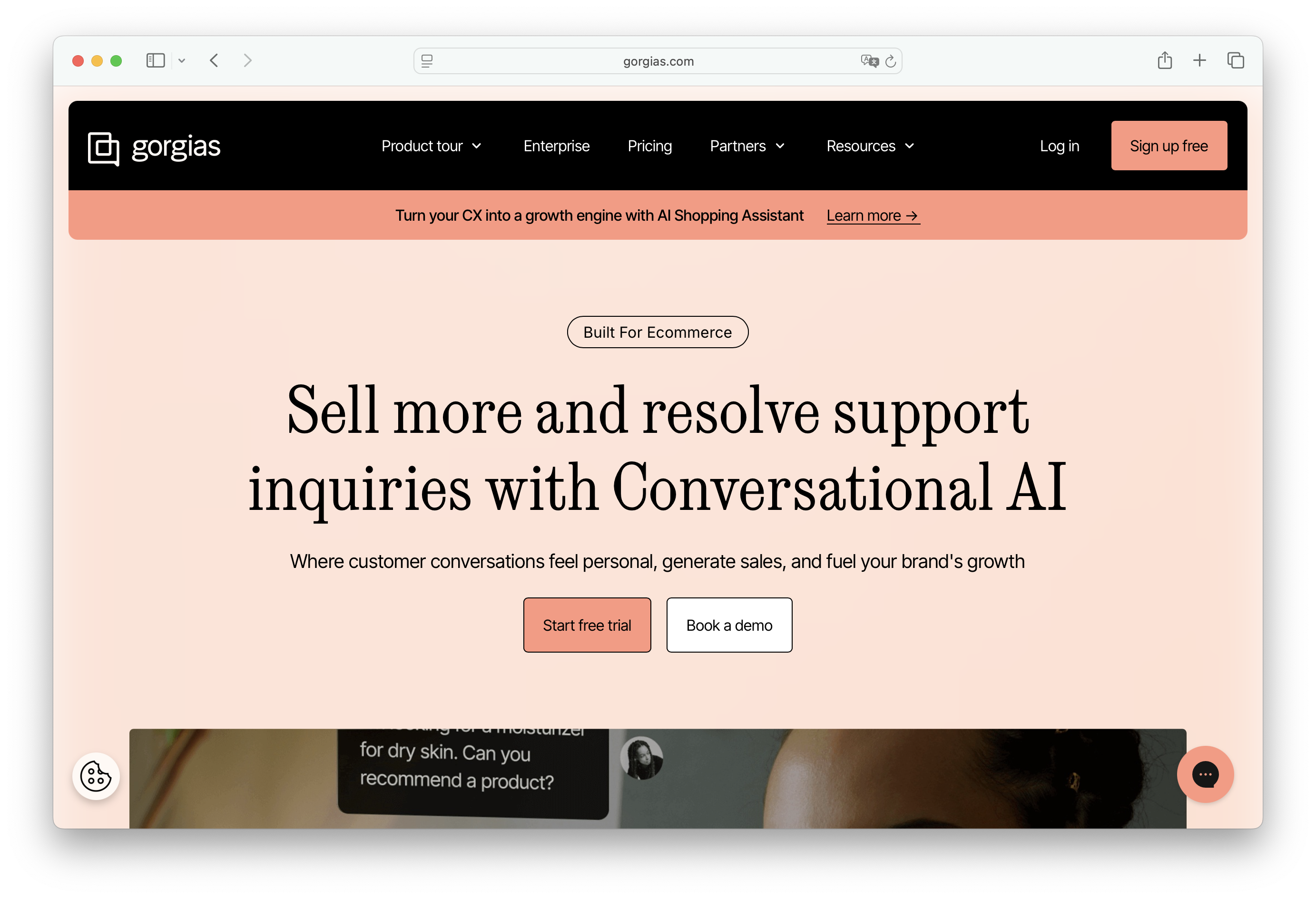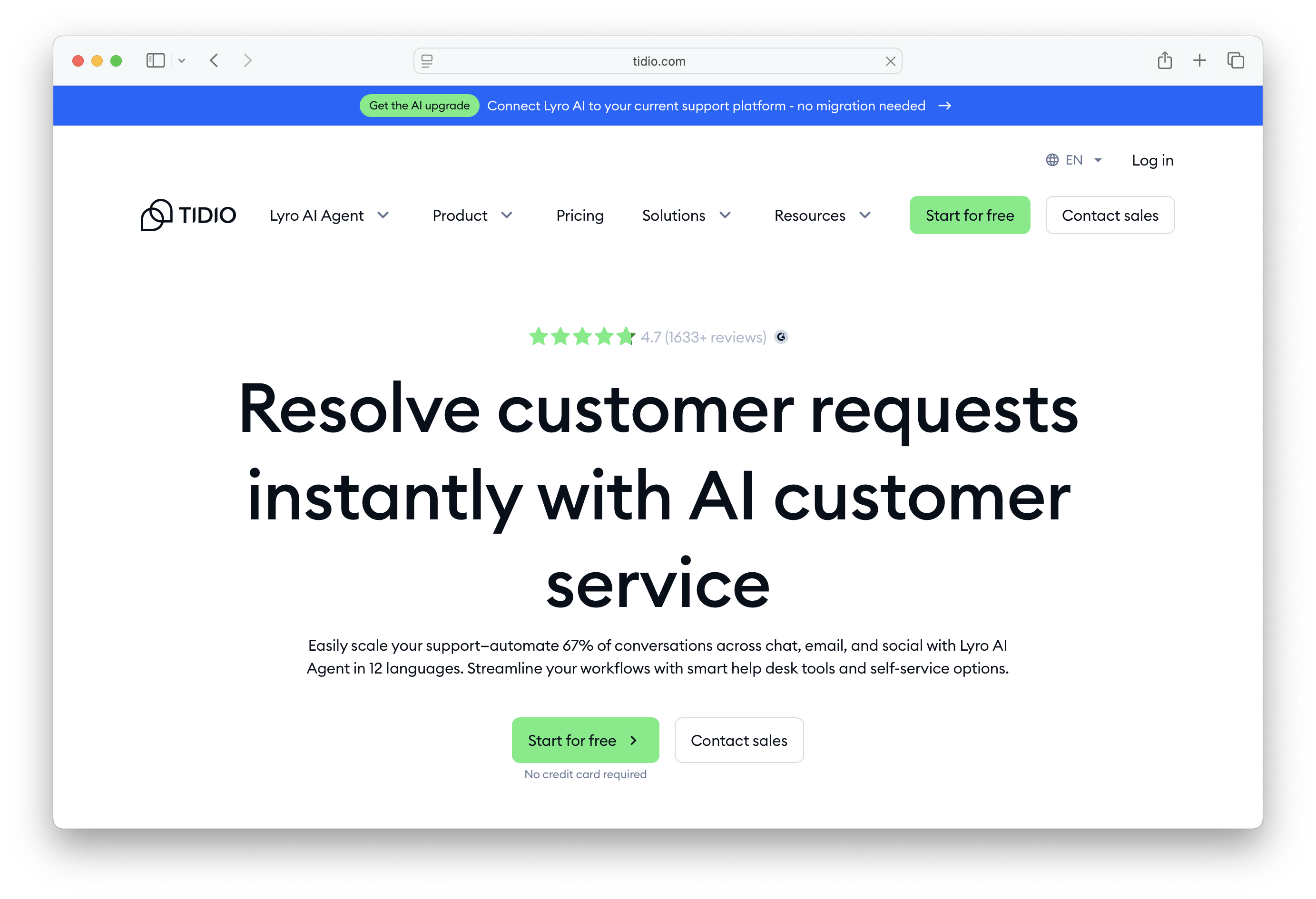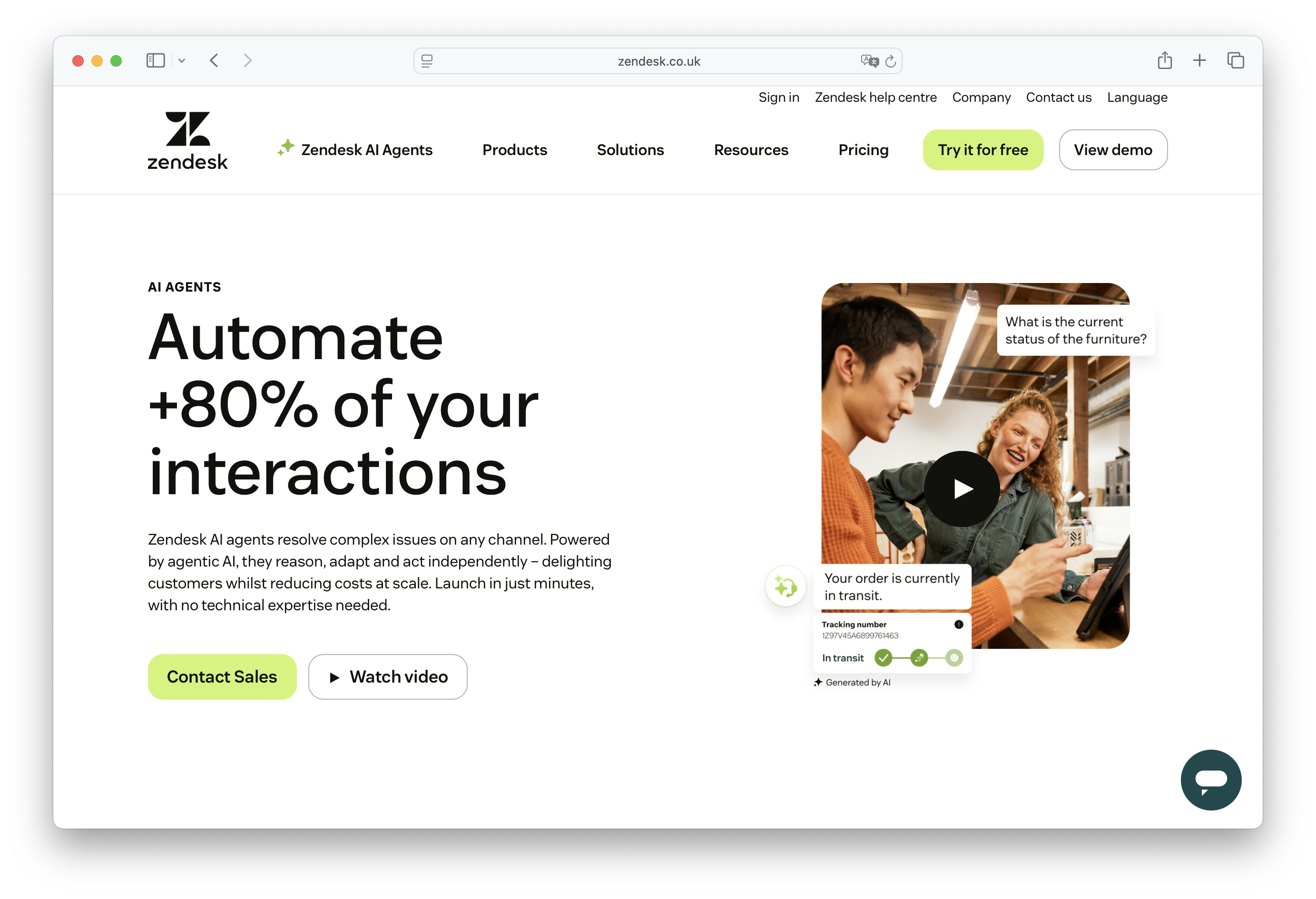Best AI customer service chatbot for e-commerce (2026)
In this article, we’ll walk through the top AI-powered customer service chatbots built for e-commerce in 2026. Whether you want to automate more of your support or just find a chatbot that fits your store’s needs, this guide has you covered.

Running an online store means dealing with a flood of support questions from “Where’s my order?” to “Can I return this?” and everything in between. As your business grows, those tickets don’t get any easier to handle. That’s why more and more e-commerce teams are turning to AI chatbots to lighten the load.
In this article, we’ll cut through the noise and spotlight the top AI-powered customer service tools for e-commerce in 2026. We’re talking real helpers that can handle the routine stuff so your team can focus on what really matters. Let’s help you find the chatbot that fits your store and scales your support.
The list: The top 6 AI customer service chatbots for e-commerce
Here’s a quick rundown of some of the best AI customer service chatbots for e-commerce in 2026:
- Engaige
- Gorgias
- Tidio
- Richpanel
- Zendesk AI
- Re:amaze
We picked these based on how well they fit with common e-commerce platforms, how smart their AI really is, and how they handle everything from simple questions to tricky order issues. Whether you’re running a growing Shopify store or just want a solid chatbot that works out of the box, there’s something here for you.
No rankings or winners here. Just a clear list to help you get a feel for what’s out there. If you think we missed a solid option, let us know!
1. Engaige

Engaige (that’s us!) is a purpose-built AI customer service agent for fast-growing DTC brands on Shopify. Unlike basic bots, Engaige doesn’t just reply to tickets, it actually resolves them. Think full end-to-end automation of 40-80% of your repetitive customer service tickets: order issues, returns, warranties, FAQs, and more.
Our AI agent plugs directly into your existing support stack and Shopify backend to pull real-time order, product, and customer data and then applies your exact business rules to take intelligent actions. That means fewer “Let me check on that for you” messages, and more actual resolutions your customers appreciate.
Engaige can handle chat, email, and social DMs, with built-in testing tools to preview responses before going live. And with a guided onboarding process, we make sure your AI agent is trained and launched fast.
Website: letsengaige.com
Key features:
- Deep Shopify integration for real-time product/order info
- Customisable policy builder and AI training workflows
- Automates support across chat, email, and social DMs
- Built-in testing and transparency into every AI decision
- Human fallback and escalation routing
- Quick onboarding support from real humans
Pros
✅ Automates up to 80% of tickets with full resolution
✅ Real AI agent, not just assist or macros
✅ Deep e-commerce understanding (returns, variants, warranties)
✅ Designed to scale your support without losing CX quality
Cons
❌ Requires a short initial training phase (but that’s also how it learns your brand)
Best for: Shopify stores in fashion, beauty, or electronics ready to scale support without scaling headcount.
2. Gorgias

Gorgias is a popular all-in-one support platform for e-commerce brands, especially Shopify merchants. Its strength lies in combining multichannel support (email, chat, social) with agent-friendly tools like macros and order editing.
The AI functionality is more assistive than autonomous. Think: suggested replies and basic triage, not full issue resolution. It’s best for teams that want to improve agent productivity, but still rely on humans to complete most tasks.
Website: gorgias.com
Key features:
- Native Shopify integration for viewing/editing orders
- Multichannel inbox and robust agent macros
- “AI Assist” suggests responses based on conversation history
- Rules and tags for managing workflows
Pros
✅ Built specifically for Shopify
✅ Helps agents respond faster
✅ Combines support channels into one inbox
Cons
❌ Limited autonomous resolution
❌ Heavy agent involvement still required
❌ Designed as a helpdesk, not an AI-first platform
Best for: Shopify brands that want a productivity-boosting helpdesk, not full automation.
3. Tidio

Tidio is a user-friendly tool that combines live chat and AI automation, built for small and midsize e-commerce businesses. Its AI bot (Lyro) can automate up to 67% of repetitive queries by answering FAQs in real time across multiple channels.
It’s easy to install and customise, but has limited workflow capabilities. While Lyro can handle simple tasks like checking order status or answering product questions, it can’t perform complex actions inside e-commerce platforms. This makes it a better fit for brands just starting with automation.
Website: tidio.com
Key features:
- Live chat and AI chatbot in one widget
- Lyro AI for multilingual FAQ responses
- Smart Views to prioritise conversations
- Omnichannel inbox for chat, email, and socials
Pros
✅ Fast, no-code setup
✅ Budget-friendly for early-stage brands
✅ Multichannel inbox to manage all support in one place
Cons
❌ AI can’t handle complex workflows on its own
❌ Fewer advanced e-commerce features than specialist tools
❌ Deeper integrations focused mainly on Shopify (less so for Magento)
Best for: Small DTC teams wanting a plug-and-play chatbot for basic customer interactions.
4. Richpanel

Richpanel is a customer service platform with e-commerce features like order lookups, multichannel inboxes, and automation workflows. Its AI Sidekick helps agents draft faster replies but doesn’t resolve tickets autonomously.
The platform shines when it comes to setting up branded self-service portals, letting customers find answers without contacting support but for end-to-end resolution, human agents still play a central role.
Website: richpanel.com
Key features:
- Self-service portal builder
- Sidekick AI for drafting replies
- Automation rules for routing and prioritising
- Centralised inbox across channels
Pros
✅ Reduces ticket volume with proactive self-service
✅ E-commerce-native integrations
✅ Useful for agent productivity
Cons
❌ AI doesn’t resolve tickets independently
❌ Requires full Richpanel platform adoption to leverage self-service and automation
❌ Not intended as a no‑agent workflow engine since agents remain part of resolution process
Best for: E-commerce brands that want to deflect (not automate) tickets.
5. Zendesk AI

Zendesk is a well-established customer support platform with powerful workflows, analytics, and customisation options. Its AI Agents offer article suggestions and auto-triage but aren’t tailored to e-commerce use cases out of the box.
You’ll get scale and structure, but at the cost of complexity. Plus, there’s no specialised support for common e-commerce queries like returns, warranty handling, or catalog-based resolution.
Website: zendesk.com
Key features:
- Omnichannel ticketing system
- Advanced SLAs and routing
- 1,500+ integrations
- AI bots for deflection, not resolution
Pros
✅ Reliable and battle-tested for high volume
✅ Deep reporting and workflows
✅ Can extend with integrations
Cons
❌ Not built specifically for e-commerce automation
❌ AI is limited to triage and assist
❌ High learning curve and price
Best for: Enterprise companies that need an all-in-one system and can invest in customisation.
6. Re:amaze

Re:amaze combines live chat, social, email, and SMS in one shared inbox, with automation features that help agents stay productive across channels. It includes pre-built bots for FAQs, greetings, and order tracking, plus strong automation for routing, tagging, and responses.
Agents can manage and modify Shopify orders directly from the Re:amaze dashboard but the AI itself doesn’t autonomously process returns or handle complex backend actions. Most tasks beyond basic information retrieval still need human input or custom workflows.
Website: reamaze.com
Key features:
- Unified multichannel inbox
- Order lookup bot for Shopify and BigCommerce
- Mobile apps for agents
- AI chatbots for basic automation
Pros
✅ Strong e-commerce platform integrations
✅ Helps agents handle requests faster
✅ Lightweight and mobile-friendly
Cons
❌ AI is assistive, not action-based
❌ No full ticket automation or reasoning
❌ Locked into Re:amaze’s UI and workflows
Best for: Support teams that want to boost agent efficiency, not replace agents.
Comparison of the best AI customer service chatbots for e-commerce
What makes a good AI customer service chatbot for e-commerce?
Not all chatbots are built for the intensity of e-commerce. Answering FAQs is one thing. But managing orders, handling emotional customers, and working across multiple channels? That’s a whole different game.
If you’re evaluating AI chatbots for your e-commerce business, here’s what to actually look for:
- Real-time product/order access and action-taking
- Omnichannel support
- Accurate intent detection and context retention
- Customisable workflows for returns, exchanges, cancellations
- Integration with e-commerce platforms
- Multilingual support
- Brand voice alignment
- Reasoning logic and steerability
Real-time product/order access and action-taking
Customers don’t just want information, they want outcomes. Whether it’s “Where’s my order?” or “Can I cancel this before it ships?”, a good AI chatbot should both retrieve the right data and act on it.
Look for bots that can:
- Instantly check and share order status
- Pull product specs, pricing, and stock availability
- Trigger actions like cancellations, refunds, or exchanges, based on real policies and logic
- Route edge cases to humans, with full context
This isn’t just about speed, it’s about removing dead ends. AI should be able to complete tasks, not just hand them off.
Omnichannel support (chat, email, social, etc.)
Support doesn’t start and stop on your website.
The right AI should handle conversations across web chat, email, and social channels like Instagram, Facebook Messenger, or even WhatsApp, ideally with full context carried across. (No one wants to repeat themselves just because they switched platforms!)
Bonus points if the handoff between human and AI is frictionless, no matter where it happens.
Accurate intent detection and context retention
There are two keys to making AI actually useful in support:
- Understanding what someone means
and
- Remembering what they said
A good chatbot doesn’t get tripped up by informal language or complex phrasing and it doesn’t forget the question halfway through the answer. It should follow multi-step conversations smoothly, without hitting dead ends or serving generic responses.
Customisable workflows for returns, exchanges, cancellations
Returns, refunds, cancellations, exchanges: these are the workflows that can make or break a support team’s day.
Rather than being locked into rigid logic, your AI chatbot should be able to adapt to your policies and processes.
Think:
- Tailored flows for different product types or regions
- Eligibility checks based on order status or timing
- Human handoff for anything messy or high-risk
The more flexible your bot is, the more it can take off your team’s plate.
Integration with e-commerce platforms
Integrations are a non-negotiable. Your AI chatbot should work natively with the tools that run your store, not force you to build workarounds.
Whether you’re on Shopify, Magento, or WooCommerce, integration means:
- Real-time access to orders, shipping, and inventory
- Personalised replies based on customer data
- Direct actions (cancel order, trigger refund, etc.) from the chat
When everything’s connected, automation actually works the way you need it to.
Multilingual support
Your customers don’t all speak the same language. Neither should your AI.
Some brands patch together translation layers on top of English-only bots, but that usually leads to stilted, confusing conversations. The better route? An AI agent that’s actually trained to understand and respond fluently in multiple languages, with full context.
Look for tools that:
- Detect a customer’s language without asking
- Understand slang, tone, and regional nuance
- Let you set language-specific workflows if needed
True multilingual support isn’t just a nice-to-have, it’s a competitive edge when you’re selling globally.
Brand voice alignment
AI responses should still sound like you. Whether your brand tone is warm and casual or formal and concise, your chatbot should match it instead of defaulting to generic language.
The best tools let you steer tone and phrasing with clear guardrails, so AI doesn’t just answer fast and it actually answers on-brand.
Reasoning logic and steerability
Should this refund be approved? Is the order still cancellable? Is this a case to escalate?
Great AI doesn’t just parrot responses. It reasons through situations. And you should also be able to guide it.
With tools like prompt controls, fallback logic, and analytics, your team can continuously shape and improve how the AI behaves.
The limitations of traditional chatbots in e-commerce
Most traditional customer service chatbots were built for FAQs, not for handling actual customer needs. That’s fine if a customer wants to know your store hours. But not so great when they’re chasing an order, changing a delivery address, or reporting a missing item.
Here’s where old-school bots start to fall short:
- Static scripts, zero reasoning: They follow a fixed decision tree. If the query falls outside it, they’ll hit a dead end (and leave your customer hanging).
- No access to live data: They can’t fetch the latest order status or check product availability. Instead, they’re stuck with whatever canned content you gave them at setup.
- No context, no memory: Traditional bots treat every message like it’s the first. There’s no sense of what the customer asked earlier or what stage they’re at.
- Hard handoffs to humans: When things escalate, the transition to a live agent is clunky (if it happens at all). Customers get bounced around, and agents get zero context.
- Not built for volume or complexity: They’re okay in low-pressure environments, but under the weight of high volumes and complex queries, they collapse fast.
Traditional chatbots were a good starting point. But today’s e-commerce brands need something smarter, faster, and more flexible.
Why growing e-commerce brands choose Engaige over basic chatbots
The simple answer? Because Engaige isn’t just a chatbot. It’s a true support agent.
Our AI agent can understand real questions, pull real data, and make real decisions.
Instead of deflecting tickets, it resolves them. Instead of handing everything off, it knows when to escalate. And instead of frustrating your team and customers, it actually helps both.
Ready to see what support can look like with an AI agent that’s built for e-commerce? Get in touch with us and meet your new AI agent.
FAQs about customer service AI chatbots for e-commerce
Can AI chatbots fully replace human agents in e-commerce?
Right now? Not entirely. However, they can handle most of the repetitive workload. AI agents today can resolve up to 80-90% of common queries like order status, returns, warranties, and product info. That frees up human agents to focus on high-touch cases, tricky customers, and sales opportunities. The best setup is a hybrid: AI handles the volume, humans handle the nuance.
Are AI chatbots secure for handling customer data?
Yes, most reputable AI platforms follow strict security protocols like data encryption, GDPR compliance, and role-based access controls. Still, it’s important to vet vendors carefully and understand how your data is stored and processed. For example, you can read Engaige’s information security policy here.
How do I train an AI chatbot on my e-commerce product catalogue?
Most AI platforms let you connect your product feed or knowledge base directly. Engaige pulls in all products, variants, collections, and more from your Shopify environment, training the AI agent on everything available about your brand and products. No manual uploads required.
What platforms integrate best with e-commerce tools like Shopify or WooCommerce?
Engaige offers strong integrations with major e-commerce platforms like Shopify. These connections allow the AI agent to pull real-time data and automate key workflows like returns or cancellations.
Lower your cost per resolution with AI customer service automation
Further reading
Continue learning with these resources about AI customer service automation.








.webp)
